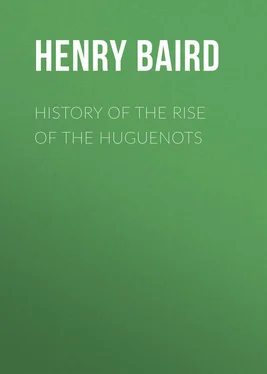Henry Baird - History of the Rise of the Huguenots
Здесь есть возможность читать онлайн «Henry Baird - History of the Rise of the Huguenots» — ознакомительный отрывок электронной книги совершенно бесплатно, а после прочтения отрывка купить полную версию. В некоторых случаях можно слушать аудио, скачать через торрент в формате fb2 и присутствует краткое содержание. ISBN: , Жанр: foreign_antique, foreign_prose, на английском языке. Описание произведения, (предисловие) а так же отзывы посетителей доступны на портале библиотеки ЛибКат.
- Название:History of the Rise of the Huguenots
- Автор:
- Жанр:
- Год:неизвестен
- ISBN:http://www.gutenberg.org/ebooks/30708
- Рейтинг книги:4 / 5. Голосов: 1
-
Избранное:Добавить в избранное
- Отзывы:
-
Ваша оценка:
- 80
- 1
- 2
- 3
- 4
- 5
History of the Rise of the Huguenots: краткое содержание, описание и аннотация
Предлагаем к чтению аннотацию, описание, краткое содержание или предисловие (зависит от того, что написал сам автор книги «History of the Rise of the Huguenots»). Если вы не нашли необходимую информацию о книге — напишите в комментариях, мы постараемся отыскать её.
History of the Rise of the Huguenots — читать онлайн ознакомительный отрывок
Ниже представлен текст книги, разбитый по страницам. Система сохранения места последней прочитанной страницы, позволяет с удобством читать онлайн бесплатно книгу «History of the Rise of the Huguenots», без необходимости каждый раз заново искать на чём Вы остановились. Поставьте закладку, и сможете в любой момент перейти на страницу, на которой закончили чтение.
Интервал:
Закладка:
Immense crowds at Huguenot preaching.
The canons of Sainte Croix.
As early as in February, Beza was of the opinion that the King of Navarre would not suffer him to remain longer in the realm to which he himself had invited him so earnestly only six months before. At all events, he would be publicly dismissed by the first of May, and with him many others. With this disquieting intelligence came also rumors of an alliance between the enemies of the Gospel and the Spaniard, which could not be treated with contempt as baseless fabrications. 24 24 Letter to Calvin, Feb. 26, 1562, apud Baum, ii., App., 167, 168.
But meanwhile the truth was making daily progress. At a single gathering for prayer and preaching, but a few days before, twenty-five thousand persons, it was computed, had been in attendance, representing all ranks of the population, among whom were many of the nobility. 25 25 Ibid., ubi supra .
In the city of Troyes, a few weeks later, eight or nine thousand persons assembled from the neighboring country to celebrate the Lord's Supper, and the number of communicants was so great that they could not all partake on a single day; so the services were repeated on the morrow. 26 26 Recordon, Le protestantisme en Champagne (Paris, 1863), from MSS. of Nicholas Pithou, p. 105. This learned jurist, the equal of his more celebrated brothers in ability, and their superior in moral courage, has left his testimony respecting the beneficent influence of the reformed doctrines upon his fellow-citizens: "A la verité la ville de Troyes en général fit une perte incroyable en la rupture de cette Église. Car c'était une grande beauté et chose plus que émerveillable de la voir si bien fleurie. Il se voyoit en la jeunesse, touchée par la prédication de la parole de Dieu, qui auparavant était si dépravée que rien plus, un changement si subit et si étrange que les catholiques mêmes en étoient tout étonnés. Car, tels qui au précédent se laissaient aller du tout à leurs voluptez et s'étaient plongez en gourmandises, yvrogneries et jeux défendus, tellement qu'ils y passaient la plus grande et meilleure partie du temps, et faisaient un fort mauvais ménage, depuis qu'ils étaient entrés dans l'Église quittaient du tout leur vie passée et la détestaient, se rangeant et se soumettant allègrement à la discipline ecclésiastique, ce qui était si agréable aux parents de tels personnages, que, quoiqu'ils fussent catholiques, ils en louaient Dieu." Ibid., pp. 107, 108.
Elsewhere there was equal zeal and growth. Indeed, so rapid was the advance of Protestantism, so pressing the call for ministers, that the large and flourishing church of Orleans, in a letter written the last day of February, proclaimed their expectation of establishing a theological school to supply their own wants and those of the adjacent regions; and it is no insignificant mark of the power with which the reformatory movement still coursed on, that the canons of the great church of Sainte Croix had given notice of their intention to attend the lectures that were to be delivered! 27 27 "Nous avons espérance que non seulement la jeunesse d'icy se façonnera par la main d'un si excellent ouvrier qui nous est venu; mais que les chanoines mesmes de Sainte-Croix le viendront ouyr en ses leçons, ce qu'ils ont desja déclaré. De quoy sortiront des fruicts surmontant toute expectation." Gaberel, Hist. de l'égl. de Genève, i., Pièces justificatives, 168.
In such an encouraging strain did "the ministers, deacons, and elders" of the most Protestant city of northern France write on the day before that deplorable massacre of Vassy, which was to be the signal for an appeal from argument to arms, upon which the newly enkindled spirit of religious inquiry was to be quenched in partisan hatred and social confusion. Within less than two months the tread of an armed host was to be heard in the city which it had been hoped would be thronged by the pious students of the gospel of peace, and frenzied soldiers would be hurling upon the floors of Sainte Croix the statues of the saints that had long occupied their elevated niches.
We must now turn to the events preceding the inauspicious occurrence the fruits of which proved so disastrous to the French church and state.
The Guises meet the Duke of Würtemberg at Saverne.
Having at length made sure of the co-operation of the King of Navarre in the contest upon which they had now resolved with the view of preventing the execution of the Edict of January, the Guises desired to strengthen themselves in the direction of Germany, and secure, if not the assistance, at least the neutrality of the Protestant princes. Could the Protestants on the other side of the Rhine be made indifferent spectators of the struggle, persuaded that their own creed resembled the faith of the Roman Catholics much more than the creed of the Huguenots; could they be convinced that the Huguenots were uneasy and rebellious radicals, whom it were better to crush than to assist; could, consequently, the "reiters" and "lansquenets" be kept at home – it would, thought the Guises, be easy, with the help of the German Catholics, perhaps of Spain also, to render complete the papal supremacy in France, and to crush Condé and the Châtillons to the earth. Accordingly, the Guises extended to Duke Christopher of Würtemberg an invitation to meet them in the little town of Saverne (or Zabern, as it was called by the Germans), in Alsace, not far from Strasbourg. 28 28 The archives of Stuttgart contain the instructive correspondence which the Duke of Guise had, ever since the previous summer, maintained with the Duke of Würtemberg. From the letters published in the Bulletin of the French Protestant Historical Society (February and March, 1875), we see that François endeavored to alienate Christopher from the Huguenots by representing the latter as bitter enemies of the Augsburg Confession, and as speaking of it with undisguised contempt. (Letter of July 2, 1561, Bull., xxiv. 72.) Christopher made no reply to these statements, but urged his correspondent to a candid examination of religious truth, irrespective of age or prescription, reminding him (letter of Nov. 22, 1561) that our Lord Jesus Christ "did not say 'I am the ancient custom ,' but 'I am the Truth .'" (Ibid., xxiv. 114.) And he added, sensibly enough, that, had the pagan ancestors of both the French and the Germans followed the rule of blind obedience to custom, they would certainly never have become Christians.
The duke came as he was requested, accompanied by his theologians, Brentius and Andreä; and the interview, beginning on the fifteenth of February, 29 29 Guise's original invitation was for Saturday, January 31st, but Christopher pleaded engagements, and named, instead, Sunday, Feb. 15th. (Ibid., xxiv. 116, 117.)
lasted four days. Four of the Guises were present; but the conversations were chiefly with Francis, the Duke of Guise, and Charles, the Cardinal of Lorraine; the Cardinal of Guise and the Grand Prior of the Knights of St. John taking little or no active part. Christopher and Francis had been comrades in arms a score of years back, for the former had served several years, and with no little distinction, in the French wars. This circumstance afforded an opportunity for the display of extraordinary friendship. And what did the brothers state, in this important consultation, respecting their own sentiments, the opinions of the Huguenots, and the condition of France? Happily, a minute account, in the form of a manuscript memorandum taken down at the time by Duke Christopher, is still extant in the archives of Stuttgart. 30 30 The relation was first noticed and printed by Sattler, in his Geschichte von Würtemberg unter den Herzögen. I have used the French translation by M. A. Muntz, in the Bulletin, iv. (1856) 184-196.
Little known, but authentic beyond the possibility of cavil, this document deserves more attention than it has received from historians; for it places in the clearest light the shameless mendacity of the Guises, and shows that the duke had nearly as good a claim as the cardinal, his brother, to the reputation which the Venetian ambassador tells us that Charles had earned " of rarely telling the truth ."
Интервал:
Закладка:
Похожие книги на «History of the Rise of the Huguenots»
Представляем Вашему вниманию похожие книги на «History of the Rise of the Huguenots» списком для выбора. Мы отобрали схожую по названию и смыслу литературу в надежде предоставить читателям больше вариантов отыскать новые, интересные, ещё непрочитанные произведения.
Обсуждение, отзывы о книге «History of the Rise of the Huguenots» и просто собственные мнения читателей. Оставьте ваши комментарии, напишите, что Вы думаете о произведении, его смысле или главных героях. Укажите что конкретно понравилось, а что нет, и почему Вы так считаете.












